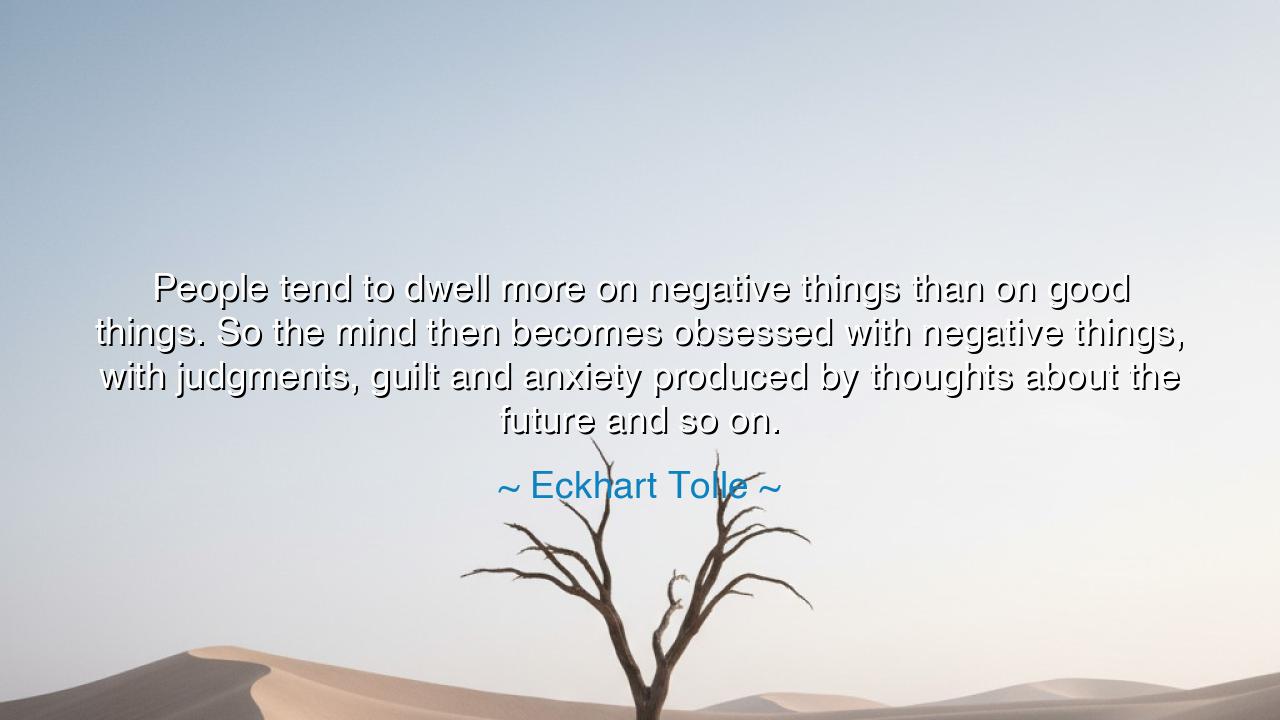
People tend to dwell more on negative things than on good things.
People tend to dwell more on negative things than on good things. So the mind then becomes obsessed with negative things, with judgments, guilt and anxiety produced by thoughts about the future and so on.






"People tend to dwell more on negative things than on good things. So the mind then becomes obsessed with negative things, with judgments, guilt and anxiety produced by thoughts about the future and so on." These words of Eckhart Tolle bring forth a profound reflection on the nature of the human mind—a mind that often seeks out the shadows, that gravitates towards the darkness of fear, regret, and uncertainty. Tolle’s insight speaks to the age-old human tendency to focus on the negative, to allow the mind to become trapped in a web of thoughts that lead to suffering. This is a lesson that stretches back through the ages, echoed in the teachings of the ancients.
The great philosophers of old knew the struggle of the human mind. Socrates warned against the tyranny of unexamined thoughts, while Buddha spoke of the nature of desire and suffering, and how attachment to the past and the future ensnares the mind in illusion. The ancient Greeks and Indians both understood that the mind, in its unchecked state, has a tendency to become obsessed with negativity—whether it be judgments, guilt, or the fear of an uncertain future. It is not the world itself that causes our suffering, but our attachment to these thoughts, and our unwillingness to live fully in the present moment.
The story of King Midas offers a poignant example. The king, blessed with the gift of turning everything he touched into gold, found himself overwhelmed by the consequences of his wish. His greed and his inability to appreciate the present moment led him to lose everything he cherished: his family, his health, and his peace of mind. His obsession with wanting more, with focusing on a future filled with riches, trapped him in an unending cycle of desire and despair. King Midas' story is a warning: when the mind becomes fixated on what is lacking—on the negative— it loses sight of the beauty and abundance that exists in the present.
In Tolle’s words, we see that the mind is not only prone to dwelling on the negative, but also to obsessing over judgments, guilt, and anxiety about the future. These thoughts, if left unchecked, take root and grow into forces that govern our actions, leaving us disconnected from the truth of who we are. The philosophers of the East spoke of the importance of mindfulness, of living with awareness in the present. The teachings of Taoism urge us to flow with the present moment, not to resist it or fear it, but to embrace its natural rhythm. In contrast, when we become absorbed in negativity, we become disconnected from the very source of peace and contentment that lies within us.
Consider the life of Marcus Aurelius, the Roman Emperor and Stoic philosopher, who faced not only the pressures of ruling an empire but also the turmoil of war and personal loss. In his Meditations, he often reminded himself that the mind must not dwell on things beyond its control. He knew that worrying about what might happen in the future only robbed him of the present moment. He faced hardship with calmness and dignity, turning his thoughts inward and focusing on what he could control: his own actions and attitudes.
This idea of mindfulness, of controlling the mind and its tendency to dwell on the negative, is not a new concept, but an ancient practice. It is a practice of discipline, of choosing what we allow to take root in our hearts and minds. To break free from the cycle of negative thinking, we must practice awareness, recognizing the fleeting nature of our thoughts, and allowing them to pass without attaching judgment. When we do so, we open ourselves to the peace that resides in the present moment.
The lesson here is clear: do not allow the mind to become obsessed with the negative, for it will only lead you further into suffering. Release the thoughts of guilt, judgment, and anxiety, for they serve only to keep you trapped in the shadows. Instead, focus on the present moment, for it is in this moment that you will find true peace. Let go of attachment to the future, and you will discover the abundance and joy that already exist around you. The future is uncertain, and the past is gone, but the present is where your true power lies. Live fully in the now, and the mind will no longer dominate you—it will serve you.






AAdministratorAdministrator
Welcome, honored guests. Please leave a comment, we will respond soon